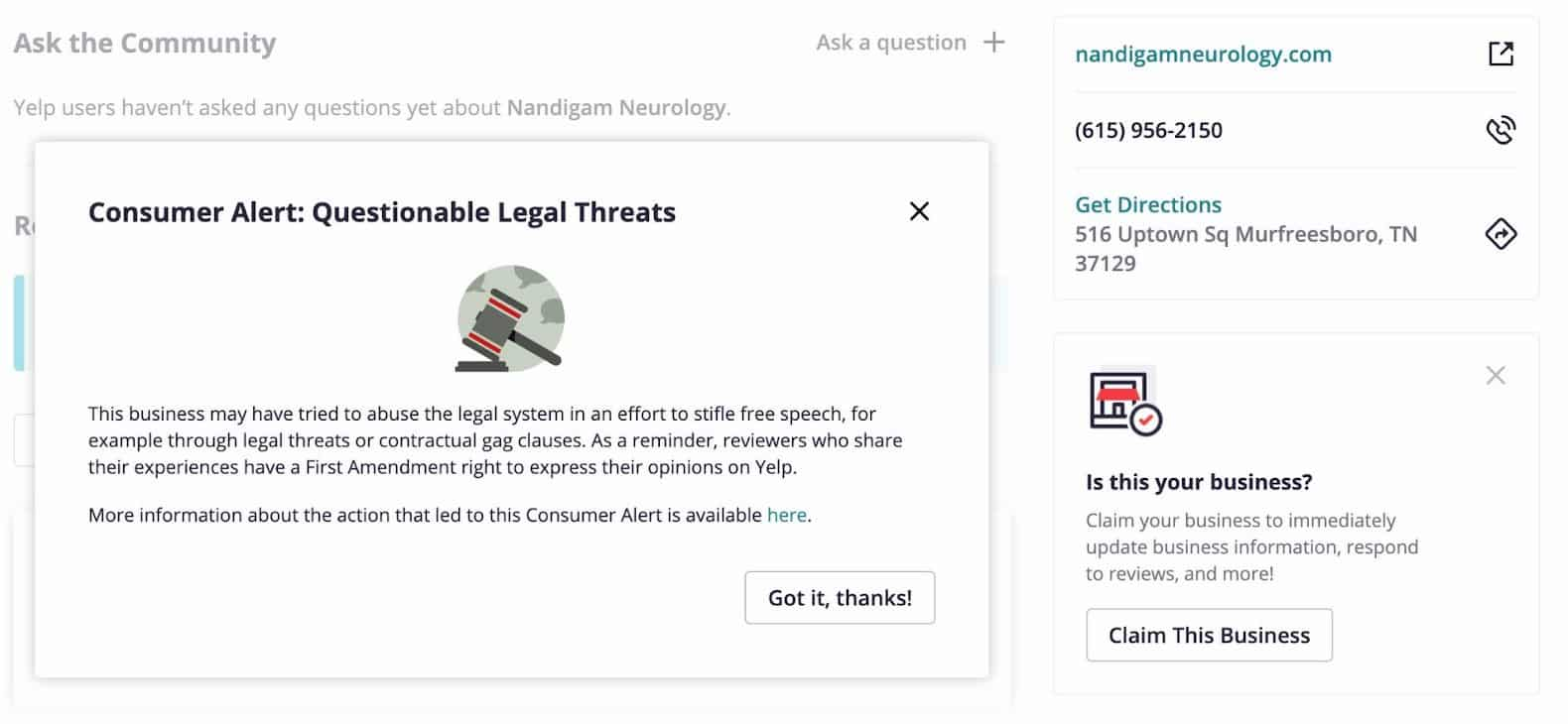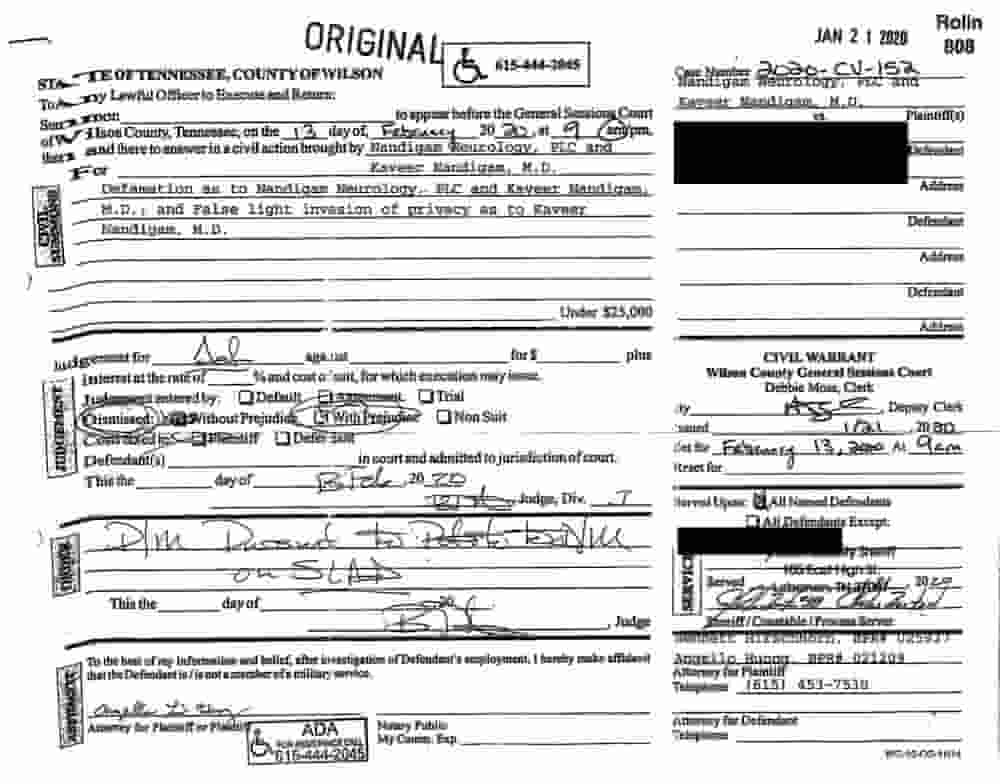Can You Be Sued for an Online Review
11 minute read
Get Sued for Leaving Negative Reviews? Maybe.
It'south the golden era of online reviews. No one is spared from the judgment of strangers anymore. If you're a business owner, you might cringe at that thought – and then wonder how to alter it. Spoiler alarm: suing the reviewer is normally non the best course of action. Consumers are reviewing every detail of their lives on sites like TripAdvisor, Yelp, Google, and Facebook. Review civilisation is so ingrained in about of usa that leaving an online review is the assumed next step after finishing a meal, checking out of a hotel, or leaving a doctor's role. While a complaint that a receptionist was rude may seem like an innocent act of free speech to the reviewer, the stakes are high for business organisation owners: Reviews tin can be devastating for a visitor's reputation. And it isn't just the aggregate ratings on websites like Yelp that thing – a simple Google search can easily highlight past grievances. The importance of positive online reviews has led some businesses to do whatever information technology takes to protect their 5-star ratings – but what's the fix? Can you really be sued for leaving bad reviews? And what types of things tin can land reviewers in legal hot water? This article will dive into the world of online review management, including common charges against online reviewers, protections, case examples, and what a business can do when a customer is unhappy instead of suing them. In a word, yep. As a business possessor or private, you lot tin sue somebody for just well-nigh anything...that y'all tin can testify. That said, simply because you lot're right doesn't hateful that you'll win your case. Here are a few reasons a business organization tin cite for a lawsuit: The number ane reason for lawsuits over online reviews is that the review is only not true. Online reviewers should carefully choose their language when writing reviews. When writing a review online, consider the post-obit: While writing an online review, recall that the words you employ can easily be misunderstood, misinterpreted or taken out of context. Proceed in mind that as long every bit your review is based on facts and your personal point of view, information technology can be less vulnerable to a lawsuit or other legal activity. In most cases, online reviewers are protected every bit long as their statements are truthful. Most states have laws that brand it illegal for businesses to interfere with or manipulate online reviews. The laws are intended to prevent companies from "gaming the system" past either soliciting or paying people to write positive things near their businesses, or by pressuring customers into removing or modifying negative comments. In that location are laws that help ensure consumers tin can share their honest opinions without the fearfulness of being bullied by businesses. Here are a few examples of laws that protect online reviewers. What does SLAPP stand up for? SLAPP stands for Strategic Lawsuit Against Public Participation. SLAPPs are lawsuits designed to "silence critics past forcing them to spend money to defend a lawsuit." Anti-SLAPP laws vary from country to state and protect the correct of all of us to speak freely most matters of public interest, assuasive us to criticize—and praise—companies, products and services without the fearfulness of ending up in courtroom. Under AB 2365, business owners can also be fined up to $10,000 if they retaliate against a reviewer or attempt to get a customer to waive their right to post a negative review. Department 230 of the Communications Decency Deed says that "No provider or user of an interactive computer service shall exist treated as the publisher or speaker of whatsoever information provided by some other information content provider." This protects online intermediaries that host or republish speech (recall Yelp, Amazon, YouTube, or even smaller bloggers) from being sued over comments or reviews left on their sites. Hither's a expect at some of the lawsuits that accept been filed against reviewers, and why they might not be the all-time idea for business concern owners. A Washington couple existence sued for $112,000 and $28,000 per week for posting one star reviews following an encounter with a covering visitor. The company was hired by their landlord to fix a leaky roof. The couple claims to have had a bad experience with the company after a telephone call with a "rude" receptionist. They each left one star reviews online. The owner of the company called them asking that they take down the reviews. The couple refused to remove the reviews, claiming that they were truthful and therefore should stay upwardly. They were then served with a lawsuit filed on behalf of the roofing company for defamation and intentional interference with business expectancy. There are ii main factors working against the couple in this case: When asked if the couple had a right to post their negative reviews, the roofing company's chaser told Seattle'due south KING-Telly news: "Information technology depends why they did that. If they were doing it merely to express their opinion, that'due south what other customers have done in the by. I don't have an issue with that. ERS doesn't have an issue with that. But when you cross the line and you use this forum to crusade intentional damage to a family unit-owned business and hurt them and their employees and their business concern, you've crossed the line...They intentionally harmed ERS by posting ane-star reviews for the purpose of getting a report they weren't entitled to." Critics of the lawsuit cite this equally an example of a SLAPP. The roof was ultimately repaired past some other visitor. Last nosotros looked, the case is awaiting a courtroom trial. A Tennessee adult female was sued for $25,000 after posting a negative review of her father'due south doctor. The 2019 lawsuit accused her of defamation and false light. Here'southward what she posted on Yelp: In January 2020, the lawsuit was dropped citing Tennessee's Public Participation Act, which protects people who are sued for their speech. The doc fought the decision and refiled the suit. However, the Tennessee Court of Appeals sided with the lower court's determination and dismissed the suit. If you visit the doctor's Yelp page today, you will see a consumer alert for questionable legal threats popup over the posted reviews. This is Yelp's response to attempts to stifle gratis speech. Y'all tin even click the link to see the case file: That's 1 of the most of import questions every business concern owner, marketer and manager has to respond. It'due south not ever easy to defuse a situation gracefully, though. When a customer or client is unhappy, your best choice is to listen. At Reputation Ten we've plant that most people but want to be heard. It sounds simple, just it'due south true. Of course, giving them something for free often helps as well – simply sayin'. Listening doesn't just mean letting them vent, and it's most definitely non a way to convince them they're wrong about how they feel. Listening means you're hearing them with the goal of understanding what they really want. Work with your customer to empathize why they are unhappy, and be willing to offer a solution to their problem. Heed with all your ears. Dealing with negative reviews in a level-headed and responsible manner will not only amend your online reputation, simply salvage you time and money dealing with unnecessary lawsuits. Here are a few other tactics for dealing with negative online reviews: Or you could do what Botto Bistro's owner did in an try to remove himself from Yelp's clutches. Chef Davide Cerretini requested customers go out i-star Yelp reviews in exchange for 25% off a pizza. We don't recommend this option, non only because information technology is technically against Yelp'south guidelines, just because it could backlash spectacularly. Nonetheless, nosotros admire Cerretini's grassroots efforts to level the Yelp playing field on his own terms. Consumers have a powerful vox, and that power can cripple a brand's reputation in the blink of an eye. Companies have long been enlightened of this, and their response has been to try and suppress bad reviews: sending out stop and desist letters, suing unruly reviewers, or deleting negative posts. But that strategy only works for so long, as companies will eventually find themselves the bailiwick of yet another damning review. There are just too many people on the cyberspace that are willing to take companies to job for non coming together expectations (whether or not those expectations are practical. Need help dealing with negative reviews? Contact us today to develop a review management strategy that volition go along to serve your business long-term. Although you may have a legitimate case, suing somebody over an online review should be a concluding resort. Consider the effect it can take on your reputation. Instead of jumping straight to suing somebody, consider dealing with the negative review past other ways, such every bit contacting the reviewer, responding publicly to the review, or flagging it for community guidelines. When a client or client is unhappy, your best choice is to listen. Piece of work with your client to understand why they are unhappy, and be willing to offering a solution to their problem. Ask them to consider removing or editing their review. A business tin sue if an online review is untruthful, libelous, slander, defamation of character, intentionally interferes with business expectancy, violates privacy rights, or breaches a contract. Notation: Reputation X is not a police house and does not manipulate legal communication.Highlights
Sections
Can y'all sue someone for an online review?
Can you exist sued if you write the review?
Are there protections for online reviewers?
Anti-SLAPP laws
California'southward Yelp law
Communications Decency Human action
Examples of lawsuits over online reviews
Tenants sued for leaving one star reviews
Tennessee woman sued for a negative review of doctor on Yelp



What do you lot do when a client is unhappy?
Going full negative
Last thoughts
Can yous sue for bad reviews FAQs
Should I sue someone for leaving a negative review almost my business?
What is the all-time mode to deal with negative reviews?
When can a business sue for online reviews?
TOPICS: Online Review Management Defamation Review Management
furphydianstand1949.blogspot.com
Source: https://blog.reputationx.com/bad-review-lawsuits